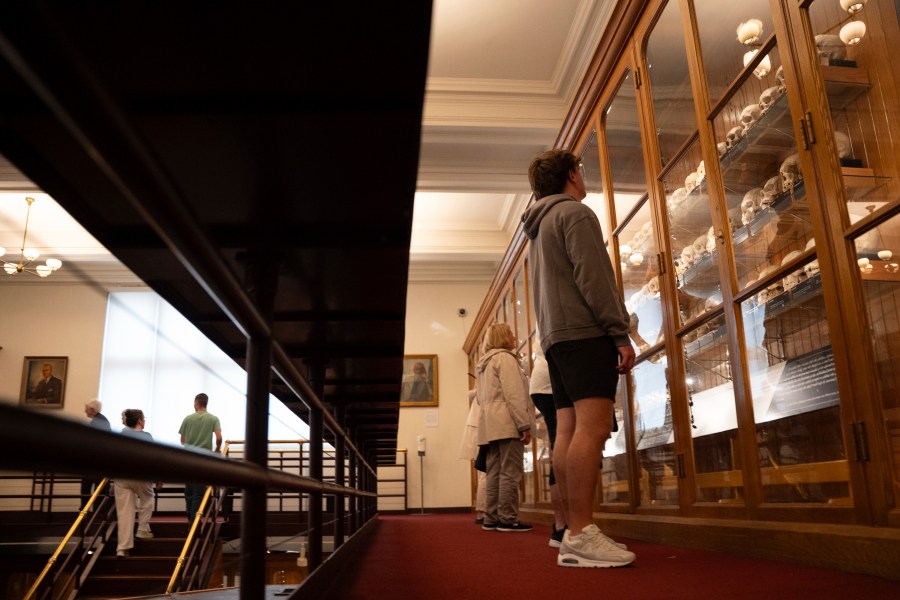Health
Philadelphia Medical Museum Updates Human Remains Policies

The College of Physicians of Philadelphia has announced significant changes to the policies governing the collection and display of human remains at the Mutter Museum. This overhaul aims to align the museum’s practices with contemporary ethical standards, addressing concerns surrounding the handling of its extensive collection of over 6,500 specimens, including organs and bones.
New Guidelines for Photography and Specimen Collection
As part of its revised policies, the museum will restrict photography of human remains, permitting it only with museum approval. Public photography remains prohibited. Sara Ray, director of interpretation and engagement at the Mutter Museum, explained that “photography will be allowed as long as it serves an educational purpose,” though the definition of educational use is subject to interpretation.
The majority of the remains in the museum’s collection were gathered between 1840 and 1940, primarily from Philadelphia. At that time, such collections were essential for medical education, with many specimens obtained during surgeries and autopsies. This practice was common among medical societies, though many similar institutions have since closed.
The museum is also taking steps to “de-anonymize” its collection by researching the personal histories of the individuals represented. The goal is to present their stories within the broader context of medical history and bodily diversity. Museum researchers are delving into various records to uncover these histories but are not utilizing DNA analysis. In some instances, they possess details recorded by the physicians who collected the specimens.
Addressing Historical Context and Ethical Concerns
The updated human remains policy acknowledges that many specimens were “obtained in unacceptable circumstances, including through force or duress.” The museum recognizes that some of its displays may represent instances of scientific racism. Among the collection, there are approximately 50 specimens believed to be of Native American origin. Since April 2024, the museum has repatriated nine remains to two tribes and one Native Hawaiian group.
In a bid to prioritize ethical considerations, the museum will no longer loan out remains to other institutions. Access for research purposes will require approval from a committee that includes several senior museum leaders. Research will focus on the history of medicine rather than purely biological studies. These policy changes follow a comprehensive two-year review process aimed at engaging the public in shaping the museum’s future.
As part of its efforts to enhance educational outreach, the Mutter Museum is also working to restore hundreds of educational videos that were removed from YouTube in January 2023. The videos will be reorganized to eliminate outdated content.
The museum plans to significantly limit future acquisitions of human remains. While it may consider accepting donations from living individuals or through bequests, it retains the right to decline such offers. Visitor Ashley Davis, 47, expressed appreciation for the museum’s commitment to educating guests about the lives and challenges faced by those represented in the collection. “I think it’s important to know where these come from. These were human beings,” she remarked.
The Mutter Museum, founded from the collection of surgeon Dr. Thomas Dent Mutter, attracts approximately 100,000 visitors annually. Dr. Mutter donated 1,700 objects and $30,000 in 1859 to establish the museum with the aim of enhancing medical education. Today, the collection has grown to over 35,000 objects, supported by a comprehensive medical library housing around half a million items.
-

 Lifestyle4 months ago
Lifestyle4 months agoLibraries Challenge Rising E-Book Costs Amid Growing Demand
-

 Sports3 months ago
Sports3 months agoTyreek Hill Responds to Tua Tagovailoa’s Comments on Team Dynamics
-

 Sports3 months ago
Sports3 months agoLiverpool Secures Agreement to Sign Young Striker Will Wright
-

 Lifestyle3 months ago
Lifestyle3 months agoSave Your Split Tomatoes: Expert Tips for Gardeners
-

 Lifestyle3 months ago
Lifestyle3 months agoPrincess Beatrice’s Daughter Athena Joins Siblings at London Parade
-

 World3 months ago
World3 months agoWinter Storms Lash New South Wales with Snow, Flood Risks
-

 Science4 months ago
Science4 months agoTrump Administration Moves to Repeal Key Climate Regulation
-

 Science3 months ago
Science3 months agoSan Francisco Hosts Unique Contest to Identify “Performative Males”
-

 Business4 months ago
Business4 months agoSoFi Technologies Shares Slip 2% Following Insider Stock Sale
-

 Science4 months ago
Science4 months agoNew Tool Reveals Link Between Horse Coat Condition and Parasites
-

 Sports3 months ago
Sports3 months agoElon Musk Sculpture Travels From Utah to Yosemite National Park
-

 Science4 months ago
Science4 months agoNew Study Confirms Humans Transported Stonehenge Bluestones








